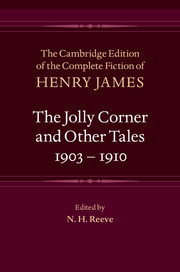Book contents
- Frontmatter
- Contents
- Acknowledgements
- List of Abbreviations
- General Editors’ Preface
- General Chronology of James’s Life and Writings
- Introduction
- Textual Introduction
- Chronology of Composition and Production
- Bibliography
- The Jolly Corner and Other Tales 1903–1910
- Glossary of Foreign Words and Phrases
- Notes
- Textual Variants
- Emendations
- Appendices
VIII
Published online by Cambridge University Press: 11 April 2021
- Frontmatter
- Contents
- Acknowledgements
- List of Abbreviations
- General Editors’ Preface
- General Chronology of James’s Life and Writings
- Introduction
- Textual Introduction
- Chronology of Composition and Production
- Bibliography
- The Jolly Corner and Other Tales 1903–1910
- Glossary of Foreign Words and Phrases
- Notes
- Textual Variants
- Emendations
- Appendices
Summary
If she kept to herself, from the morrow on, for three days, her adoption of that course was helped, as she thankfully felt, by the great other circumstance and the great public commotion under cover of which it so little mattered what became of private persons. It was not simply that she had her reasons, but she couldn't during this time have descended again to Fleet Street even had she wished, though she said to herself often enough that her behaviour was rank cowardice. She left her friend alone with what he had to face, since, as she found, she could in absence from him a little recover herself. In his presence, the night of the news, she knew she had gone to pieces, had yielded, all too vulgarly, to a weakness proscribed by her original view. Her original view had been that if poor Beadel, worked up, as she inveterately kept seeing him, should embrace the tragic remedy, Howard Bight wouldn't be able not to show as practically compromised. He wouldn't be able not to smell of the wretched man's blood, morally speaking, too strongly for condonations or complacencies. There were other things, truly, that, during their minutes on the Embankment, he had been able to do, but they constituted just the sinister subtlety to which it was well that she should not again, yet awhile, be exposed. They were of the order—from the safe summit of Maida Hill she could make it out—that had proved corrosive to the muddled mind of the Frankfort fugitive, deprived, in the midst of them, of any honest issue. Bight, of course, rare youth, had meant no harm; but what was precisely queerer, what,when you came to judge, less human, than to be formed for offence, for injury, by the mere inherent play of the spirit of observation, of criticism, by the inextinguishable flame, in fine, of the ironic passion? The ironic passion, in such a world as surrounded one, might assert itself as half the dignity, the decency, of life; yet, none the less, in cases where one had seen it prove gruesomely fatal (and not to one's self, which was nothing, but to others, even the stupid and the vulgar) one was plainly admonished to—well, stand off a little and think.
- Type
- Chapter
- Information
- The Jolly Corner and Other Tales, 1903–1910 , pp. 131 - 142Publisher: Cambridge University PressPrint publication year: 2017

